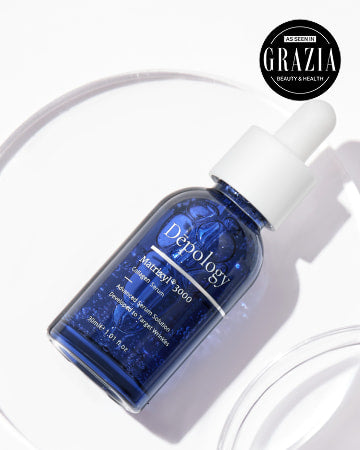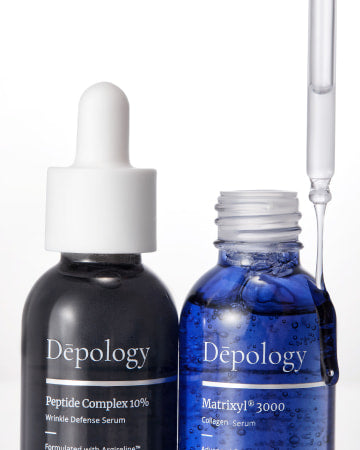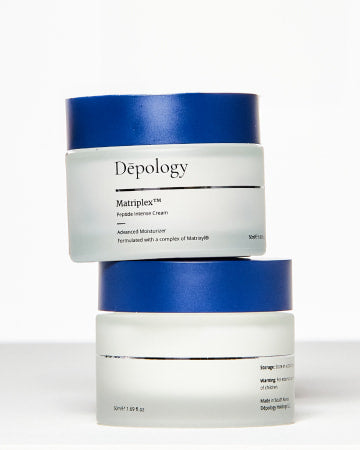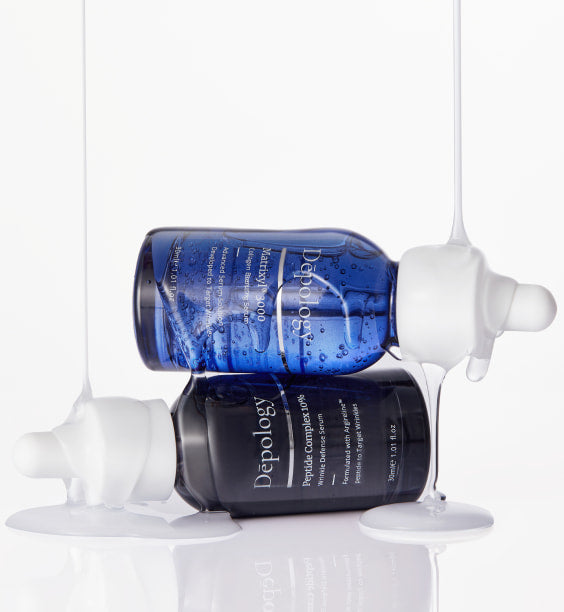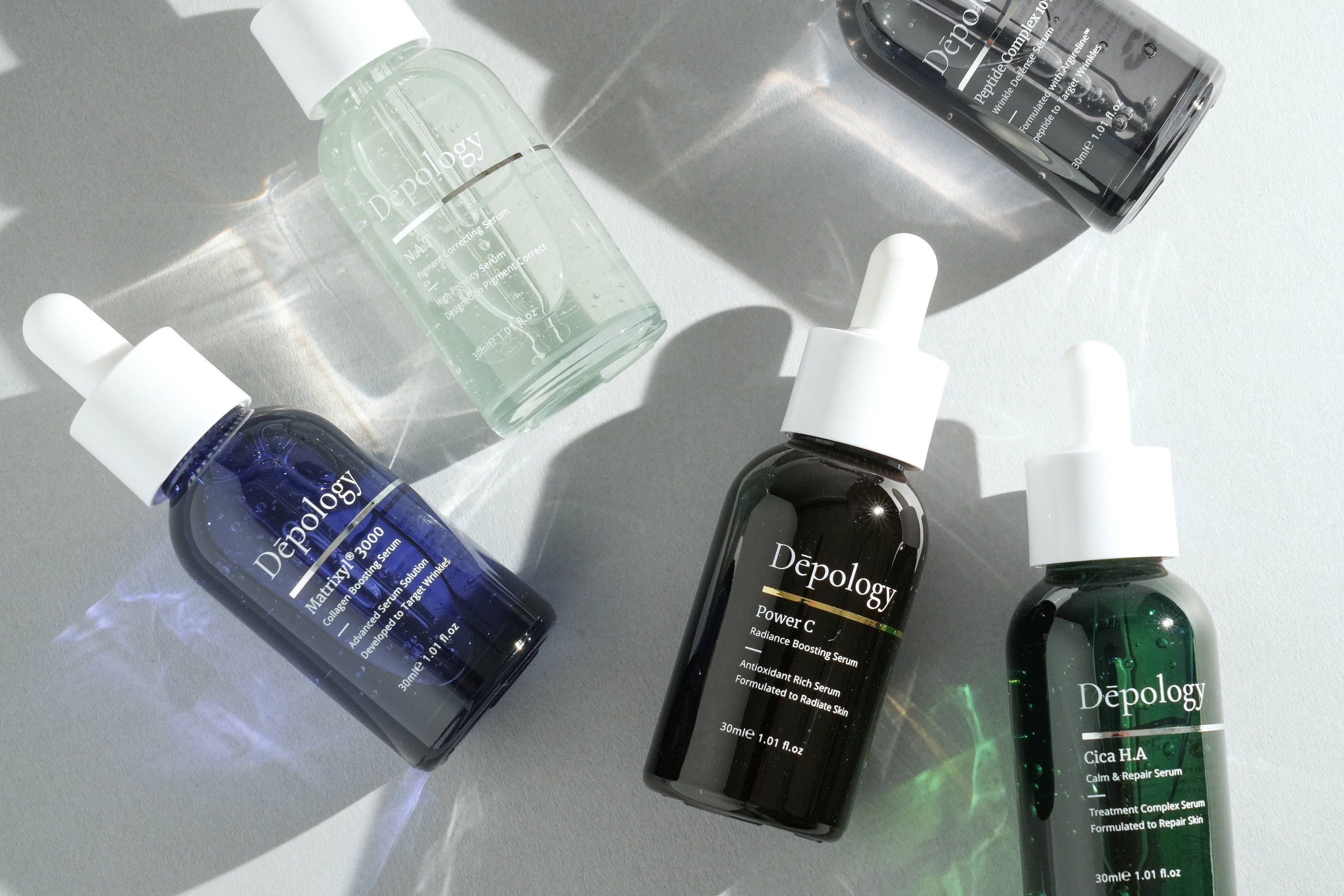
Serums For Sensitive Skin | Depology Edition
As we age, our skin becomes increasingly sensitive to just about everything. One day, we're using the same products we've been using for years, and the next day, we're breaking out in red, itchy patches. Serums are typically the most potent skincare product in a skincare routine, so it's vital that you use serums that are right for your skin type, especially if you have sensitive skin. At Dēpology, we understand the struggle, which is why we offer a wide range of serums that are not harsh on sensitive skin. In this article, we'll go over our best serums for sensitive skin.
How To Find The Perfect Serum For Sensitive Skin
Since serums are so potent, choosing the perfect serum for your sensitive skin can feel like trying to find a needle in a haystack. Luckily, there are options available for those of us who need something gentler. The key is to look for serums with gentle, non-irritating ingredients that won't cause further inflammation or irritation. Avoid harsh chemicals and fragrances, and opt for soothing options instead. Patch testing is also crucial to ensure you're not allergic to any ingredients in the serum. And remember, what works for someone else may not work for you, so don't be afraid to experiment and find the perfect match for your sensitive skin.
Which Serum Ingredients Are Best For Sensitive Skin?
When it comes to selecting a serum for sensitive skin, the active ingredient list is the most critical factor to consider. Look for serums with natural ingredients known for their soothing and anti-inflammatory properties, such as cica, arnica, calendula, and chamomile. These ingredients will help calm redness and irritation while providing hydration to the skin. Check the ingredients list for non-irritating moisturizers like hyaluronic acid.
On the other hand, avoid ingredients like alcohol, retinoids, high concentrations of Vitamin C, and chemical exfoliants, as they can be too harsh for sensitive skin. Focus on serums that are hydrating and nourishing rather than aggressive and stripping. With the right ingredients, you can achieve a healthy, glowing complexion without irritating your sensitive skin.
The Best Serums For Sensitive Skin
At Dēpology, we understand the struggle of finding the perfect serum for sensitive skin, which is why we've curated a list of our best serums that are suitable for sensitive skin.
1. Cica H.A. Calm & Repair Serum
The Dēpology Cica H.A Calm & Repair Serum is a game-changer when it comes to soothing and repairing sensitive skin. This serum combines the calming powers of cica, also known as centella asiatica, with the hydrating properties of hyaluronic acid. Its lightweight formula absorbs quickly and deeply hydrates the skin, reducing redness and inflammation. This calming serum is specially formulated to be kind to sensitive skin, making it the perfect tool to protect and moisturize your skin without irritation.

2. Matrixyl® 3000 Collagen Boosting Serum
The Dēpology Matrixyl® 3000 Collagen Boosting Serum is here to kick your skincare routine up a notch. This powerful serum is formulated with Matrixyl® 3000, a potent peptide that stimulates collagen production and reduces the appearance of fine lines and wrinkles. Despite its anti-aging properties, this serum is gentle enough for sensitive skin, thanks to its hydrating ingredients like hyaluronic acid and aloe barbadensis. Use it daily to achieve smoother, firmer, and more resilient skin without irritating your sensitive complexion.

4. Peptide Complex 10% Argireline™ Peptide Serum
The Dēpology Peptide Complex 10% Argireline™ Peptide Serum is a powerful anti-aging serum that packs a punch without irritating sensitive skin. This serum is formulated with Argireline™, a peptide that reduces the appearance of fine lines and wrinkles by inhibiting small muscle contractions to prevent wrinkles from forming. It also contains Vitamin E to keep the skin hydrated and supple. To combat irritation, it includes a K-Science Blend, a combination of soothing ingredients like cica, heartleaf, fig extract, and camomile flower oil. With regular use, this serum can help improve the smoothness and elasticity of your skin, all while being gentle.

3. Dark Spot Correcting N.A.T. Serum
Dark spots are a common concern for many, but they can be an even bigger nuisance for those with sensitive skin since non-irritating serums can be difficult to come by. Luckily, the Dēpology Dark Spot Correcting N.A.T. Serum can reduce dark spots without harsh ingredients. Formulated with natural antioxidants and brightening ingredients like niacinamide, arbutin, and tranexamic acid (TXA), this serum effectively targets and fades dark spots without irritating or causing further sensitivity. It also contains green tea, which has anti-inflammatory properties to soothe the skin.

FAQ
Is Niacinamide Good For Sensitive Skin?
Niacinamide, also known as Vitamin B3, has become a popular ingredient in skincare products for its numerous benefits, including improving skin texture, reducing hyperpigmentation, and boosting hydration. But is it suitable for sensitive skin? The short answer is yes! Niacinamide is non-irritating and suitable for all skin types, including sensitive skin. It helps strengthen the skin barrier and has anti-inflammatory properties, making it an excellent choice. Our Dark Spot Correcting N.A.T. Serum contains niacinamide, making it an excellent option for sensitive skin looking to reap the benefits of this potent ingredient.
Can I Use Vitamin C On Sensitive Skin?
Vitamin C is a powerful antioxidant with many benefits for the skin, such as brightening, fighting free radicals, and boosting collagen production. However, for those with sensitive skin, Vitamin C can be a tricky ingredient to incorporate into your skincare routine. For sensitive skin, it's crucial to choose the proper form of Vitamin C, such as magnesium ascorbyl phosphate or sodium ascorbyl phosphate, which are gentler than traditional ascorbic acid. It's also essential to patch test and introduce Vitamin C slowly into your routine to avoid any potential irritation.
The Final Verdict
Finding the right serum for your sensitive skin may seem like an impossible task, but we're here to tell you that it's not. With the right ingredients and formulations, serums can provide incredible benefits to your skin without causing any irritation. At Dēpology, we believe that everyone should have access to effective skincare, no matter their skin sensitivity. So go ahead and pamper yourself with our collection of serums tailored to your skin's needs.


